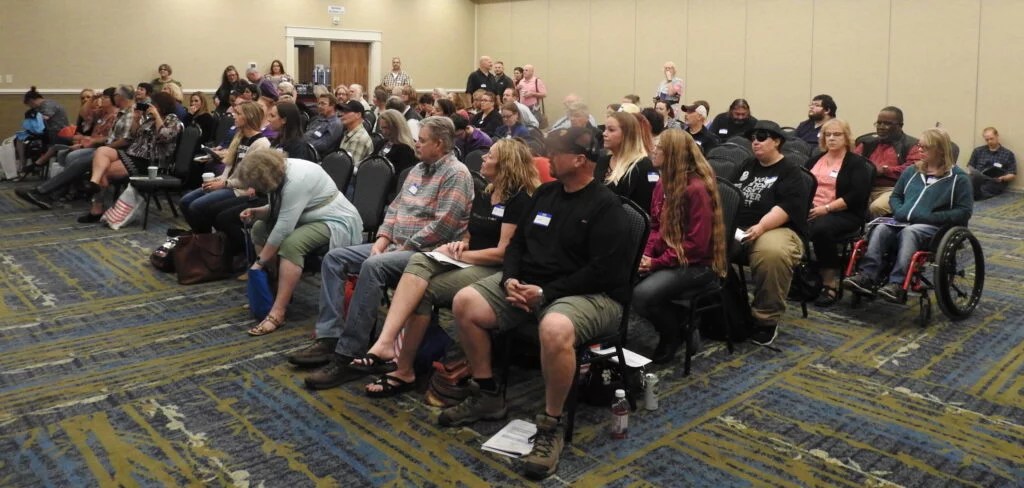We are a network of individuals who are on the path of recovery.
We identify as being in recovery from mental health, substance abuse and or addiction struggles. Together we share information, provide peer support, advocate with a united voice and improve the system. We come from places all across Montana, with different stories and experiences but together we make a difference. This is the Recovery Movement in Montana.


Realizing Recovery Blog
Recovery is Life
Recovery is the beginning of positive change and evolving into the spirit and human being an individual was meant to be. Its the bond and balance of body, mind, and soul. It is the discovery of who Creator really made an individual to be.
Relationships in Recovery
I believe that relationships are what gives each of our lives purpose. The connection that each of us have with the people in our lives is what gives us the ability have the emotions that we get to experience. I also believe that we get to have a relationship with ourselves.
Advocacy
Check out our new page dedicated to tracking state and federal bills, executive orders, and lawsuits.
 Standing up for what we believe is right, having a voice, making choices in recovery, and sharing our own recovery story are some of the things that make up advocacy and self-advocacy.
Standing up for what we believe is right, having a voice, making choices in recovery, and sharing our own recovery story are some of the things that make up advocacy and self-advocacy.
Let’s start with self-advocacy which refers to an individual’s ability to effectively communicate, convey, negotiate, or assert his/her own interests, desires, needs, or rights. It involves making informed decisions and taking responsibility for those decisions (Van Reusen et al., 1994).
Knowing yourself and your strengths, needs, and interests is the first step toward advocating for your rights. Once we begin to find our way on the path of recovery, we may want to begin to advocate for ourselves with those around us—peer supporters, friends, family, service providers, and doctors. These conversations may be difficult, but having them is vital to your recovery. Remember, you are the expert on yourself.
It may be that prior to getting on the path to recovery, others were making decisions for you or acting in what they believed to be your best interest. Now may be the time for you to let others know what you believe to be in your best interest. You may find yourself in the process of taking control and making decisions affecting your life and perhaps others’ lives. This process of self-determination means making informed choices, problem solving, setting and attaining goals—essentially being a self-advocate.
Advocacy or advocating for others may be something you are interested in doing. Advocating for another person isn’t about acting in a person’s perceived best interest, but it is standing with a person to ensure they are able to articulate and obtain what they want or need. Perhaps you may consider speaking up and advocating for various changes in the services in your community.
Here are a few examples of advocacy:
- Speak to your legislature or a special committee.
- Get involved with an advocacy group or organization.
- Share your recovery story to support others in recovery.
- Whether advocating for yourself, for others, for your community, or as part of an organization, advocacy is very self-empowering. You can make a real difference in your life, the lives of others, and even the community.
- Reach out to Montana’s Peer Network and share your recovery story on one of our “Recovery Talks” podcasts.
Advancing Advocacy Blog
Societal Issues Affecting Mental Health
It is hard to not see suffering on a daily basis around the world, in the United States and here in Montana. When I tune in for my daily dose of news, I am often struck by the lack of awareness around mental health related issues. For example, in Texas where the extreme flooding occurred there is virtually no reporting on mental health counseling, or peer support for the massive amount of grief and loss that is taking place. In the nearly weekly reporting of mass shootings at places of work, schools and in our communities across the nation, we fail to address mental health needs.
Snapshot - Challenges in the CBHPSS Workforce
The certified behavioral health peer support specialist workforce has faced many challenges since its inception 8 years ago. We fought to establish ourselves in the behavioral health system, we have had to educate and inform the public, and we have had to grow the workforce. MPN has been training peer supporters since 2015 long before certification went into effect in 2018. The basis for the training then and now is the National Practice Standards from SAMHSA. We have trained more than one thousand peer supporters during the last ten years which has provided us with a unique perspective on the workforce. We are not new to the game as are some of the other trainers. Nor are we from out of state here to get wealthy, then disappear after we get a check. We want to see a strong behavioral health peer support workforce now and into the future. In order to do that there needs to be a platform for identifying and addressing the issues. Montana lacks that platform. One that is free from outside influence. At MPN, we have tried many times over the years to participate in such an effort only for it to get corrupted, forcing us to step away. In this article I have broken down the most notable challenges in the behavioral health peer support workforce and some possible solutions.



